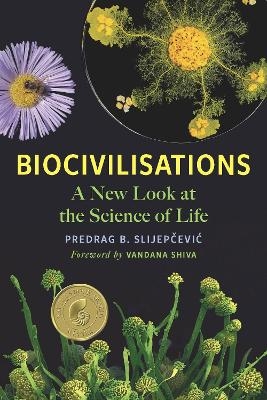
Biocivilisations
Chelsea Green Publishing Co (Verlag)
978-1-64502-138-4 (ISBN)
'Read this book if you would like to understand the intelligence of living systems.' Dr Denis Noble, University of Oxford
‘A welcoming yet fiercely challenging and provocative read shining a light on the way we look at the science of life.’ LoveReading
What is life? This is arguably the fundamental question in all of science, and yet many scientists believe that life can be reduced to mechanistic factors, such as genes and information codes. But in a world as rich and complex as this one, can such an assertion really be true?
Biocivilisations is a thrillingly original look at the mystery of life and a recognition of the complex civilisations of bacteria, viruses, fungi, plants and animals that have preceded the human world by billions of years.
Dr Predrag Slijepčević, senior lecturer in the Department of Life Sciences at Brunel University, reconsiders the limited scope and timeframe of our current ‘scientific revolution’ and shares how – from the tiniest bacteria to the largest mammals – the living world has long fostered ancient biocivilisations: how ants practice agriculture, how insects perform surgery, how trees conduct research, how slime moulds build networks as complex as our modern transportations systems and more. More than 99.99 percent of life on Earth has existed without humanity and life will continue without humans long into the future.
Biocivilisations challenges us to reconsider the limited scope and time-window of our current ‘scientific revolution’ and to fundamentally reimagine what we call ‘life on Earth’ by posing a powerful question: Are we really the intelligent masters over nature we think we are?
Predrag B. Slijepčević is a senior lecturer in the Department of Life Sciences at Brunel University London. He is bio-scientist interested in the philosophy of biology. In particular, Predrag investigates how biological systems, from bacteria to animals and beyond, perceive and process environmental stimuli (that is, biological information) and how this processing, which is a form of natural learning, affects the organism–environment interactions. He aims to identify those elements in the organization of biological systems that lead to forms of natural epistemology, or biological intelligence, that might qualify those systems as cognitive agents. He has published widely in peer-reviewed journals across all areas of this book. Biocivilisations is his first book. Vandana Shiva is a world-renowned environmental thinker and activist, a leader in the International Forum on Globalisation, and of the Slow Food Movement. Director of Navdanya and of the Research Foundation for Science, Technology and Ecology, and a tireless crusader for farmers’, peasants’, and women’s rights, she is the author and editor of a score of influential books, among them Oneness vs. the 1%; Making Peace with the Earth; Soil Not Oil; Globalization’s New Wars; Seed Sovereignty, Food Security: Women in the Vanguard; and Who Really Feeds the World? Shiva is the recipient of over twenty international awards, including the Right Livelihood Award (1993); the Medal of the Presidency of the Italian Republic (1998); the Horizon 3000 Award (Austria, 2001); the John Lennon-Yoko Ono Grant for Peace (2008); the Save the World Award (2009); the Sydney Peace Prize (2010); the Calgary Peace Prize (2011); and the Thomas Merton Award (2011). She was the Fukuoka Grand Prize Laureate in 2012.
| Erscheinungsdatum | 03.05.2023 |
|---|---|
| Vorwort | Vandana Shiva |
| Zusatzinfo | 26 Illustrations |
| Verlagsort | White River Junction |
| Sprache | englisch |
| Maße | 153 x 229 mm |
| Gewicht | 567 g |
| Themenwelt | Sachbuch/Ratgeber ► Natur / Technik ► Natur / Ökologie |
| Naturwissenschaften ► Biologie ► Mikrobiologie / Immunologie | |
| Naturwissenschaften ► Biologie ► Zoologie | |
| ISBN-10 | 1-64502-138-6 / 1645021386 |
| ISBN-13 | 978-1-64502-138-4 / 9781645021384 |
| Zustand | Neuware |
| Haben Sie eine Frage zum Produkt? |
aus dem Bereich


